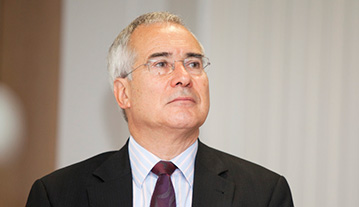Countries should not create an ‘artificial horse race’ between action on climate change and economic growth, Nicholas Stern tells ambassadors

Countries must recognise that tackling climate change does not mean sacrificing economic growth and development, Nicholas Stern told an audience of ambassadors in Paris today (26 August 2015).
Speaking at an event organised by the French Government ahead of a crucial climate change summit in Paris later this year, Professor Lord Stern, who is Chair of the Grantham Research Institute on Climate Change and the Environment at London School of Economics and Political Science and President of the British Academy, pointed out that, since the last attempt at a comprehensive global agreement in Copenhagen in 2009, “there is now much greater understanding of how economic growth and climate responsibility can come together and, indeed, how their complementarity can help drive both forward”.
He added: “To portray them as in conflict is to misunderstand economic development and the opportunities that we now have to move to the low-carbon economy. To pretend otherwise is diversionary and indeed creates an ‘artificial horse race’ which can cause real damage to the prospects for agreement.”
Lord Stern also said that “our understanding has become more intense about the dangers of delay as we see the structure of the global economy changing, particularly in terms of cities, energy systems and land use, over the next two decades”.
“There is a great danger of high-carbon lock-in,” he warned.
Professor Lord Stern concluded that the greater understanding since Copenhagen has boosted the prospects for success at the summit in Paris.
He said: “Creating an understanding that there is no horse race between economic growth and climate action, and that richer countries must support poorer countries in making the transition to low-carbon growth by setting an example and through finance and technology, should help provide the confidence that can underpin a ramping up of ambition and thus should contribute strongly to the success of the summit. A successful summit in turn further bolsters the confidence necessary for increased ambition.”
Professor Lord Stern’s speech highlighted further critical insights that had been made since the climate change summit in Copenhagen in December 2009.
He noted that “we have learned how the use of fossil fuels is creating a whole range of problems in addition to climate change, particularly huge damage through air pollution”.
Professor Lord Stern said: “Lives and livelihoods are being destroyed now on a great scale by air and other pollution. The number of deaths from this source is many millions a year globally, with affliction and maiming of many millions more.”
He drew attention to a recent study that concluded air pollution in China is responsible for more than 4000 deaths every day on average.
Professor Lord Stern said: “Air pollution in India is even worse, while Germany, Korea and, indeed, most other countries, rich or poor, have severe problems. Such pollution is mainly within country and cutting it down is strongly in the self-interest of all these countries.”
He also called for world leaders to attend the summit in Paris at the end of the year, and said that it “should not just be for environment ministers and foreign ministers”.
Professor Lord Stern said: “It must have the support and involvement of Presidents, Prime Ministers, economy and finance ministers as well. Remember, this is all about development and growth. This is about the two defining challenges of our century: overcoming poverty and managing climate change. If we fail on one, we will fail on the other.”
For more information about this media release, please contact Ben Parfitt on +44 (0) 207 955 6425 or b.parfitt@lse.ac.uk, or Bob Ward on +44 (0) 7811 320346 or r.e.ward@lse.ac.uk.
NOTES FOR EDITORS
- Lord Stern is chair of the Grantham Research Institute on Climate Change and the Environment and the ESRC Centre for Climate Change Economics and Policy, as well as I.G. Patel Professor of Economics and Government, at the London School of Economics and Political Science. Since July 2013, Lord Stern has been President of the British Academy for the humanities and social sciences. Lord Stern was with HM Treasury between October 2003 and May 2007. He served as Second Permanent Secretary and Head of the Government Economic Service, head of the review of the economics of climate change (the results of which were published in ‘The Economics of Climate Change: The Stern Review’ in October 2006), and director of policy and research for the Commission for Africa. His previous posts included Senior Vice-President and Chief Economist at the World Bank, and Chief Economist and Special Counsellor to the President at the European Bank for Reconstruction and Development. Baron Stern of Brentford was introduced in December 2007 to the House of Lords, where he sits on the independent cross-benches. He was recommended as a non-party-political life peer by the UK House of Lords Appointments Commission in October 2007.
- The ESRC Centre for Climate Change Economics and Policy (https://www.cccep.ac.uk/) is hosted by the University of Leeds and the London School of Economics and Political Science. It is funded by the UK Economic and Social Research Council (https://www.esrc.ac.uk/). The Centre’s mission is to advance public and private action on climate change through rigorous, innovative research.
- The Grantham Research Institute on Climate Change and the Environment (https://www.lse.ac.uk/grantham) was launched at the London School of Economics and Political Science in October 2008. It is funded by The Grantham Foundation for the Protection of the Environment (https://www.granthamfoundation.org/).
- The British Academy is the UK’s national academy for the humanities and social sciences. Its purpose is to inspire, recognise and support excellence in these disciplines throughout the UK and internationally, and to champion their role and value. More information about the Academy’s work is available at www.britac.ac.uk. Follow the British Academy on Twitter at https://twitter.com/britac_news.

